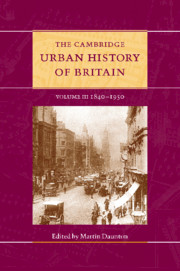Book contents
- Frontmatter
- 1 Introduction
- Part I Circulation
- Part II Governance
- Part III Construction
- Part IV Getting and spending
- 18 Industrialisation and the city economy
- 19 The urban labour market
- 20 Urban fertility and mortality patterns
- 21 The middle class
- 22 Towns and consumerism
- 23 Playing and praying
- Part V Images
- Select bibliography
- Index
- Plates 1-7
- Plates 8-14
- Plates 15-20
- Plates 21-27
- Plates 28-34
- Plates 35-41
- Plates 42-48>
- Plates 49-53
- References
23 - Playing and praying
from Part IV - Getting and spending
Published online by Cambridge University Press: 28 March 2008
- Frontmatter
- 1 Introduction
- Part I Circulation
- Part II Governance
- Part III Construction
- Part IV Getting and spending
- 18 Industrialisation and the city economy
- 19 The urban labour market
- 20 Urban fertility and mortality patterns
- 21 The middle class
- 22 Towns and consumerism
- 23 Playing and praying
- Part V Images
- Select bibliography
- Index
- Plates 1-7
- Plates 8-14
- Plates 15-20
- Plates 21-27
- Plates 28-34
- Plates 35-41
- Plates 42-48>
- Plates 49-53
- References
Summary
In 1854 the Baptist Charles Haddon Spurgeon (1834–92) took a preaching career of star quality to a wider stage at the Surrey Gardens Music Hall. He was the most famous of a number of nineteenth-century ministers of religion who were renowned for their almost theatrical style. Another who sought dramatic means to further the cause of God was William Booth, the Salvationist, for ‘why should the devil have all the best tunes?’ Together they illustrate one of the ways in which, in the nineteenth century, religion increasingly appeared to flatter the realm of leisure by imitation. In earlier centuries leisure activities had more often appeared to grow out of the religious sphere. However, in the nineteenth century conflict and competition were more important themes than cooperation, and the estrangement of leisure and religion was symbolised, above all, by the temperance movement and Sabbatarianism. Similarities and differences between the religious and the recreational are numerous, hence – from Birmingham in 1886 – the observation that Good Friday ‘was spent by the minority in the solemnities of ecclesiastical observance, but by the majority as an opportunity of pleasurable open-air enjoyment’. In fact, much churchgoing could be defined from a utilitarian point of view as having the essential social qualities of other leisure-time pursuits, namely their voluntary, non-remunerative, pleasure-seeking nature. Of course, spiritual edification was the formal aim of churchgoing, but in the later nineteenth century leisure became an aid to religious mission. By the mid-twentieth century, though, a diminishing minority attended church regularly, and leisure was often a substitute for religion.
- Type
- Chapter
- Information
- The Cambridge Urban History of Britain , pp. 745 - 808Publisher: Cambridge University PressPrint publication year: 2001
References
- 2
- Cited by



